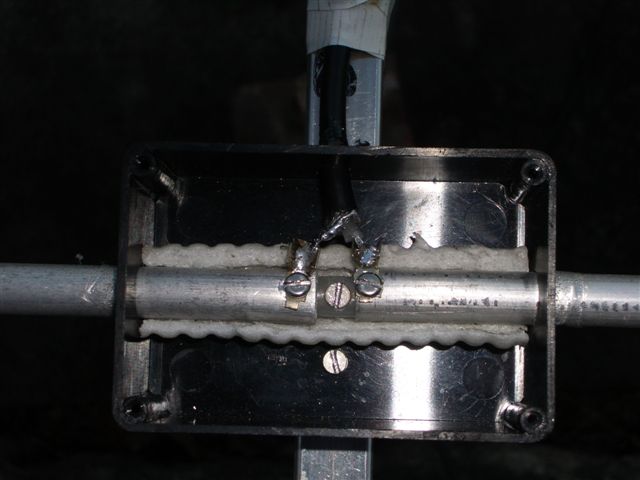2x2 element 144MHz Yagi (28ohm) DK7ZB GW4RWR
Introduction
This was built for G7TSX. I appreciated
his points during the Backpacker Championship, but he invariably called me
using a halo or a vertical. He needed more ERP. We discussed stacked halos, but
a considerable number and height of them would be needed to provide as much
gain as a pair of short yagis. G7TSX had no rotator,
so the wide E-plane beamwidth of the 2x2 would
provide a reasonable service area if orientated permanently towards his most
favourable direction.
3/4 lambda of RG-58 transforms each yagi from 28 to 90ohm. Two of these in parallel results in a theoretical feedpoint impedance
of 45ohm. In retrospect, it would have been more elegant to build this for 25ohms, so the matching would transform up to 100ohm, and then parallel to 50ohms. For testing, the phasing lines were joined to a length of RG-214 within a plastic container that originally held a 35mm film canister. This
length of phasing line provides for little slack to wrap the ends into choke baluns, given that the antennas are spaced at 1.7m. Perhaps
a 5/4 lambda length would be more practical.
The ABS feed point box is not ideal, but leaky edges can be sealed using a glue gun. The phasing lines could be made from RG-213, but I find that cable harder to wind into a choke balun. The lengths of RG-58 involved do not incurr significant loss.
Elements are 3/8" aluminium. Lengths:
Director 924mm; Driven 1010mm, spaced 210mm.
Results?
DK7ZB calculates 8.3dBd gain for the 2x2 using EZNEC.
14dB return loss measured.
A 144.3MHz 100uW test source was fed into a halo at 4m AGL, 100m away. The 2x2
was mounted as shown below; I measured almost 12dB gain by adding attenuation
(3dB steps) until the receiver indicated the same signal as the reference
dipole. This surely indicates that my dipole cannot have
been performing too well. I altered the test direction by 90degrees, and
reduced the distance to 50m. Similar results were measured.
For the inevitable useless anecdotal test, I shall tell
you that I've made two contacts with it, driven by 1W during a Christmas
cumulative contest.
A stack of 4x2 would make for an excellent antenna.


